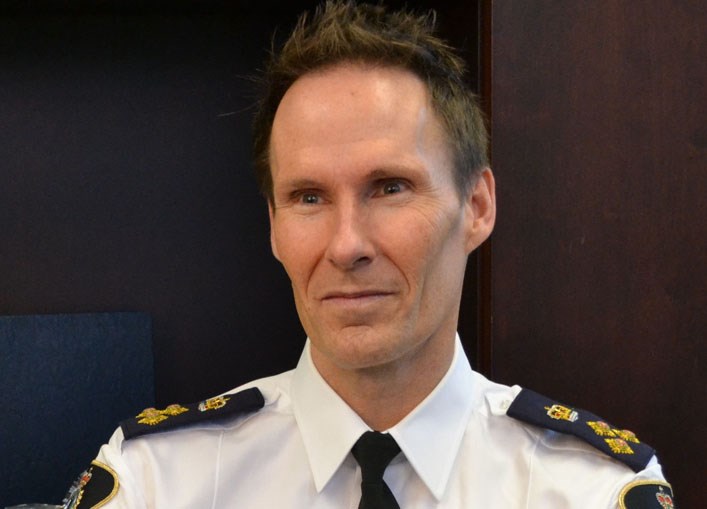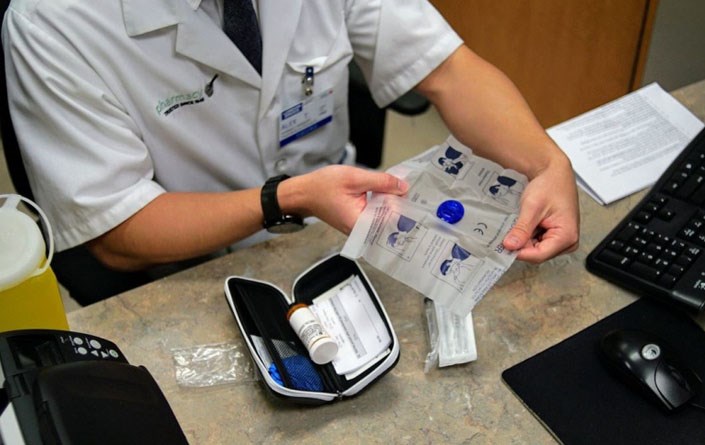Drug manufacturers played a part in a nightmare for a Delta police officer who got hooked on powerful pain medication.
That’s how a retired Supreme Court judge, who was assigned as adjudicator, described the plight of Const. Geoffrey Young in a review on the record proceeding for the officer accused of a string of drug prescription forgeries due to an addiction.
“Young has been welcomed back to work. His sergeant and two of his squad mates attended court with him for this hearing. Crown counsel dealt with the criminal charges in a compassionate way. Our provincial government has launched a class action lawsuit against 40 manufacturers of opioids alleging negligence and corruption in the way they marketed their product. The general public is well aware of the crisis created and, in my view, would not lose respect for a police disciplinary process that failed to dismiss an otherwise good officer who found himself in the position that Young did,” said Carole Lazar in her decision made public this week.
Police Complaint Commissioner Stan Lowe determined a review on the record proceeding, which took place last month in Vancouver, was necessary in the public interest after disagreeing with the disciplinary measures proposed for Young, who was found to have altered prescriptions and lied to police.
Lowe thought the disciplinary measures proposed didn’t go far enough, but Lazar took a more compassionate view.
In February of 2016, Young, who has been with Delta police since 2009, saw two criminal charges pressed against him in connection to forgery of prescription pain medication hydromorphone after a Surrey RCMP investigation. The offence that first brought him under the microscope occurred in November of 2015. At the time he was on administrative duties following a return to work after medical leave.
In June of this year, the Office of the Police Complaint Commissioner issued a notice of review on the record. The notice provides a backgrounder that notes the criminal charges against Young were concluded in May 2016 by way of an adult alternative measures agreement.
Following the conclusion of criminal proceedings, a Delta police officer was assigned to conduct an investigation and Delta police Chief Neil Dubord delegated a chief constable from West Vancouver police as the discipline authority in the matter.

The officer had a spotless record before altering drug prescriptions over several months due to addiction
A couple of months later, the Delta police investigation found there were other instances in 2015 where Young had altered prescriptions.
Due to Young's actions being the direct result of an addiction to the pain medication prescribed to him, the proposed disciplinary measures included a written reprimand and participation in a treatment program, among other measures, but Lowe disagreed and ordered the review on the record.
That hearing and ruling turned out to be a damning indictment of the pharmaceutical industry.
The proceeding heard the circumstances of how Young experienced several medical issues, including a large, painful abscess requiring surgery and a two-week hospital stay where he had been given regular doses of hydromorphone. He had been given the drug upon release from hospital but had to be readmitted due to another medical emergency, staying a couple of more weeks. Over the next 13 months he had more abscesses, several requiring surgery to remove, and during those hospital stays he was on hydromorphone.
Upon discharge attending physicians would give him a prescription for the drug and the pain management regime would be carried on by his family physicians.
A doctor who is a specialist in addiction medication was retained by insurance company Great West Life to do an assessment of Young’s drug use, giving evidence that the opioids being prescribed to Young in the year prior to the incidents of misconduct had been two-and-a-half times the “watchful dose” and over 10 times the standard set by the College of Physicians in 2016.
Lazar noted it is not surprising that during Young’s hospitalization in early 2015 he experienced withdrawal symptoms when his medication was not administered in the flexible way he had become accustomed to when he was self-dosing. Young’s wife became concerned about the number of pills he was taking but it was only at that point Young faced the fact he was addicted to his pain killers.
Lazar’s decision also goes into detail how Young had sought assistance, even trying a different medication in an attempt to counteract withdrawal symptoms, only to suffer negative symptoms, and how withdrawal and anxiety led him to falsify prescriptions, while receiving little in the way of guidance for a patient trying to self-manage and wean off the drug.
Lazar noted that, following his arrest, Young expected to be fired but Dubord and an inspector assured him they wanted to help. However, it was a new situation for them.
“There were no policies in place and no one was very clear about what the next step might be,” noted Lazar.
It was suggested Young get into residential treatment, something not raised by his previous medical practitioners, and Young would report to a treatment centre. Dubord had stepped up and said the detachment would pay for it when the insurance company notified that the money involved exceeded the limit the local office could authorize.
Young was finally given medication that effectively eased his withdrawal symptoms at that time. He would go on to get further counselling and the Crown stayed his charges when he entered an agreement which required him to do 10 hours of volunteer work at a local animal shelter.
The disciplinary proceedings under the Police Act, which had been suspended because of the outstanding criminal charges, would be re-activated and during the course of that investigation the list of alleged misconducts was expanded to include the additional incidents.
Noting Young had a spotless record before the issues arose, Lazar said Young, who didn’t commit the acts while on duty, saw few choices available to him.

Delta Police Chief Neil Dubord "stepped up" and said his detachment would pay for the officer's stay at an addiction treatment centre and would sort things out with the insurance company later
Although the commission counsel suggested Young be fired, Lazar ruled that, “Most significantly, the compassionate response he encountered in the work place and contacts that Young has established during his recovery make it unlikely that he would try to go it alone and resort to self-help if problems did arise. He now knows how to access help if he needs it... He can truly be said to have acted out of character as a result of a physical dependency that he had acquired through no fault of his own.”
Counsel for the commission argued Young deliberately misled police in the course of a criminal investigation, adding, “He did something so profoundly and so obviously wrong that it gives rise to fundamental questions about his integrity and honesty. Those questions, in the commissioner’s submission, cannot be dismissed simply by pointing to an addiction.”
However, Lazar ruled, “There is not a scintilla of evidence to suggest that Young, when not in the grips of addiction, was ever dishonest” and “Young accepted responsibility for the misconduct and has been diligent in seeking out help to remedy the problem.”
Lazar also noted that Young’s “innocent addiction to opioids” reduces his moral culpability and that a reasonable person must be fully apprised of the circumstances of the case, including serious medical problems, pain, repeated hospitalizations and surgeries and being prescribed a drug at more than 10 times the dosage which would now be permitted, becoming addicted to opioids through no fault of his own.
“In February 2015 he was released from hospital, told he was addicted and provided no guidance about how to get off these drugs. His doctor, realizing that his prescription practices had made a drug addict out of his patient, simply cut the dosage in half. Young approached three different doctors seeking help but this was a new phenomenon for them. They did not seem to know what to do about the problem. Young was not a recreational drug user who had been buying drugs illegally and now was dependent on them,” Lazar stated.

The retired judge slammed drug manufacturers for misleading physicians who thought there was no risk of addiction with new opiods
“Physicians had been misled by drug manufacturers and had believed there was no risk of addiction with these new manmade opioids. Now they found their prescribing habits under scrutiny by the College of Physicians and they did not know what to do with patients who had become addicted under their former regime.”
Lazar also said Young faced losing his job because he holds a position of public trust but that position in society, ironically, limited him as he sought help.
The retired judge, whose decision is final and conclusive, then agreed with the earlier disciplinary measures, including treatment and monitoring, instead of firing the officer.
Young is back on duty but Delta police, when asked for comment, were unable to provide any comment at this time.
This summer, the B.C. government filed a proposed class-action lawsuit against pharmaceutical companies in an attempt to recoup the costs associated with opioid addiction.
Attorney General David Eby talked about the toll opioid addiction has taken on people and families.
The suit was filed against over 40 companies involved in the manufacture, distribution and wholesale of opioids. The government alleges the companies downplayed the risks when advertising the drugs to physicians.
A poll from Angus Reid earlier this year found that one-in-five Canadians say they have been prescribed opioids in the last five years. The poll also found that one-in-eight Canadians say they have close friends or family members who had become dependent on opioids.



